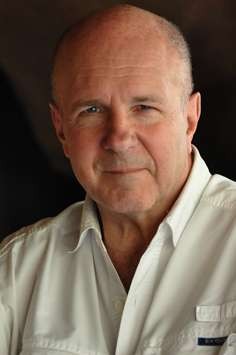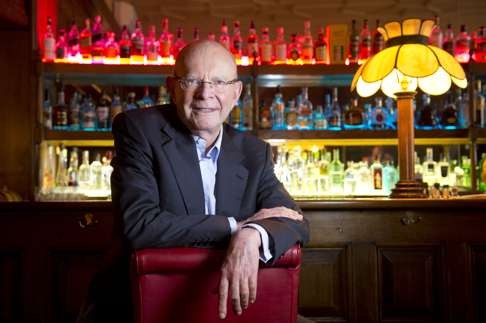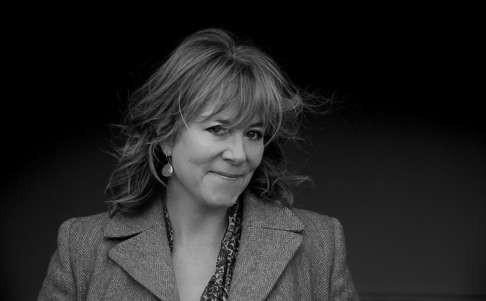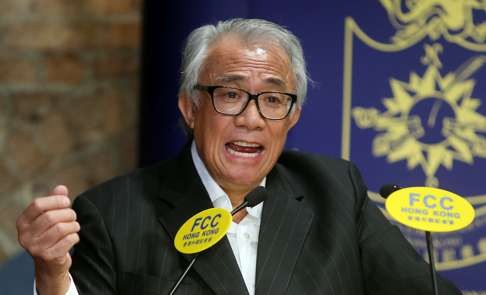
At Hong Kong Book Fair, Wilbur Smith, Simon Winchester and Hannah Rothschild field questions
The star guests at the public forum of one of the world’s best-attended book events were, however, rather upstaged by moderator David Tang

The open public forum of the 2016 edition of the Hong Kong Book Fair was, as ever, a lively affair – it could hardly fail to be, with a characteristically blunt David Tang moderating the question and answer session.
Although only a tiny percentage of visitors to one of the world’s best-attended book fairs come for the English-language books, there was still a packed house at the Hong Kong Convention and Exhibition Centre to hear the thoughts of three authors: the prolific, best-selling writer of historical swashbucklers, Wilbur Smith; journalist and narrative non-fiction writer Simon Winchester; and relatively new author Hannah Rothschild, who has produced one biography and, last year, her debut novel.
Winchester, in particular, was full of eye-opening anecdotes. Most notably the 71-year-old British writer told the tale of his first agent Charles Monteith’s practice of giving unsolicited novels to a middle-aged woman called Maud to read. After she dismissed one of them as “a load of rubbish about kids on an island”, Monteith decided to read it anyway over the weekend, and “gave William Golding a call on Monday”.

Winchester hit the big time in 1998 with The Surgeon of Crowthorne, the story of the Oxford English Dictionary and its convicted-murderer contributor W.C. Minor, and has since written books about everything from the impact of natural disasters to the life of Sinophile British scientist Joseph Needham. He added that his greatest mentor had been Welsh writer James Morris, whose 1958 book Coronation Everest, an account of the Tensing-Hillary Everest expedition, had inspired him to become a writer after he’d picked it up at random while working as geologist in Uganda, a job he said he was very bad at. Winchester said he wrote to Morris, was told he had to give up his job and get work as a journalist, then write back – and promptly did so, taking Morris by surprise.
They continued to correspond, with Morris giving Winchester writing advice, but never met until 1972 when Winchester and a friend went mountain climbing in Wales and realised they’d be near Morris’ home. They visited and were duly greeted by a woman, who introduced another woman as her wife: Morris, it turned out, was in the process of transitioning into celebrated historian and travel writer Jan Morris.
On his way to Japan to research his as yet unnamed next book, which he described as “a history of precision”, Winchester admitted that the US title of his previous book (Pacific: Silicon Chips and Surfboards, Coral Reefs and Atom Bombs, Brutal Dictators, Fading Empires, and the Coming Collision of the World’s Superpowers) was so long because his US publishers wanted to cover all the bases for internet searches.

“I always know myself when I’ve become interested enough in a subject to write a book about it,” he said. “I just have to convince the public.” The first step, he added, is convincing his editors, and it’s during the process of writing and refining proposals that he sharpens the ideas that eventually become his books into something people are likely to actually want to read.
“My editors often suggest that the books have more narrative flow. From my point of view it’s very satisfying: once I know they believe there’s a possibility the book will be a commercial success, it puts more zip in my writing.”
Getting inspiration to write has apparently never been a problem for the 83-year-old thriller writer Smith, who has authored 40 novels over more than 50 years, almost all of them set in his native Africa – although he did admit, on the subject of having a regular, disciplined writing schedule, that “I don’t; my wife does”.
The secret to staying so prolific, he added, was an ability to borrow other people’s plots and change them. “The thing a writer of fiction must have is the ability to steal from other writers. There’s only a certain fund of stories, so you need to take them and change them enough to make them your own. It becomes a good game.”
Evidently Smith has no shortage of tales to tell, confirming that he is now co-writing novels with personally selected authors “because I have all these tales to tell, and I want to get them down before something happens” to him.
“Only write what you know about and don’t listen to what anyone says,” was Smith’s advice to other authors. “Most of all, don’t ask anyone if they like the story,” as someone else will inevitably have got there first (“Oh God, Shakespeare did that”). “If anyone challenges you as a writer, you’re appalled that they’re so stupid – that they can’t see you’re a genius.”

Rothschild, by contrast, admitted that “I’m just beginning to take myself seriously as an author”, publishing her first novel, The Improbability of Love, last year after decades as a documentary maker and art-world patron. “It includes all the scurrilous people I’ve ever met in the art world,” she added. “I’m not saying if David [Tang]’s in there or not.”
Before the novel Rothschild, a member of the famous banking family, released a 2012 biography of her own great aunt, Pannonica de Koenigswarter, titled The Baroness: The Search for Nica, the Rebellious Rothschild, which began life as a 2009 BBC documentary, The Jazz Baroness. “My family really didn’t want the book published,” she said. “My great aunt has five children, and there was resistance from them, plus there’s a big taboo about discussing mental illness.”
Smith, by contrast, says he gets zero resistance from his friends and family. “They all try and claim that the heroes are based on them.”

However, the supposed stars of the show, the authors, were upstaged as ever by the moderator. Tang was his usual vituperative self, managing to raise eyebrows when he characterised the 54-year-old Rothschild, the youngest person on stage, as notably old for a relatively inexperienced writer, and repeatedly engaging in barbed banter with old friend Winchester.
He was also critical of audience members, for everything from their personal appearance to inept microphone use to asking supposedly stupid questions (he cited “Where do you get your inspiration?” as a perfect example of the latter – and then of course someone asked it); the staff carrying the microphones around; the venue; and of course the government. “Every year I ask for better lighting, so we can see the audience as well as you seeing us, but it never changes,” he said. “But it’s the Hong Kong government – what do you expect?”